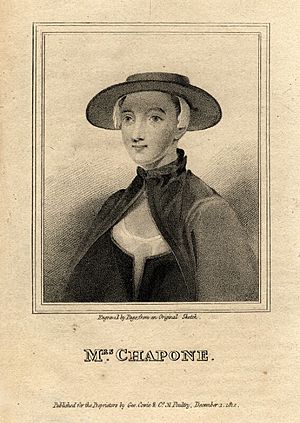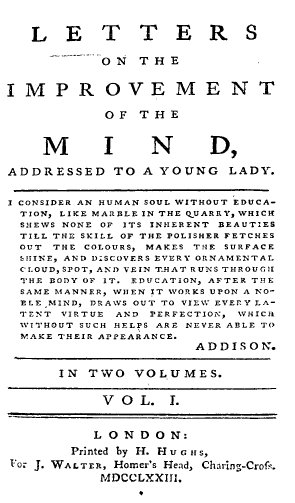Hester Chapone facts for kids
Quick facts for kids
Hester Chapone
|
|
|---|---|
 |
|
| Born | 1727 Twywell |
| Died | 1801 |
| Occupation | Writer |
| Spouse(s) | John Chapone |
| Parent(s) | |
| Family | Thomas Mulso, John Mulso |
Hester Chapone, born Hester Mulso, was an English writer. She lived from 1727 to 1801. She was known for writing "conduct books" for women. These books gave advice on how women should behave and improve themselves. Hester also became part of a group called the Bluestockings in London. This was a group of educated women who met to discuss literature and ideas.
Contents
Early Life and Education
Hester Mulso was born on October 27, 1727, in Twywell, Northamptonshire. Her father, Thomas Mulso, was a gentleman farmer. Her mother passed away around 1747 or 1748.
Even at a young age, Hester loved to write. When she was only nine, she wrote a story called "The Loves of Amoret and Melissa." Her mother, however, did not approve of this story.
Hester received a better education than most girls during her time. She learned French, Italian, and Latin. By the age of 18, she was writing regularly and exchanging letters with other writers.
Becoming a Writer
Hester's first published works appeared in 1750. She wrote four short pieces for a journal called The Rambler, which was run by Samuel Johnson.
In 1760, she married a lawyer named John Chapone. Sadly, her husband died soon after, in 1761, leaving her a widow.
After this, Hester Chapone became involved with the Bluestockings. This was a group of smart, educated women who met to talk about books and ideas. They often gathered at the home of Elizabeth Montagu.
Hester Chapone wrote two important books: Letters on the Improvement of the Mind and Miscellanies. She passed away on December 25, 1801, in Monken Hadley, Middlesex.
Books of Advice for Young Women

Hester Chapone's book, Letters on the Improvement of the Mind, was first written for her 15-year-old niece in 1773. This book became incredibly popular. By 1800, it had been printed at least 16 times. By 1829, there were 12 more editions, and it was even translated into French.
What the Letters Taught
The Letters encouraged young women to gain a good understanding of the world. Chapone suggested reading the Bible, history, and other literature. She also urged her niece to study practical skills like book-keeping and household management. She even suggested learning about botany (plants), geology (rocks and earth), and astronomy (space).
Chapone believed that only overly emotional novels should be avoided. She wanted young women to focus on learning and developing their minds.
Influence on Other Writers
Many people admired Hester Chapone's work. Mary Wollstonecraft, another famous writer, praised the Letters as one of the few self-improvement books that were truly good. Wollstonecraft used Chapone's ideas when she wrote her own book, A Vindication of the Rights of Woman, in 1792.
Chapone's book was special because it offered a detailed plan for women's education. It was based on the idea that Christianity should guide our thinking. It also stressed that women should be seen as smart, thinking individuals, not just emotional beings.
Another writer who was a personal friend and admirer of Chapone was the novelist Frances Burney. They often wrote letters to each other.
Hester Chapone's Legacy
Hester Chapone's writings had a lasting impact. The 19th-century novelist Elizabeth Gaskell mentioned Chapone in her novel Cranford. Gaskell saw Chapone as a great example of a letter writer.
Chapone's book also appears in Anne Brontë's novel Agnes Grey. Her work influenced other famous authors like Samuel Richardson, Jane Austen, and Mary Wollstonecraft.
In the novel Vanity Fair by Thackeray, a character named Miss Pinkerton is described as a great admirer of Mrs. Chapone. This shows how well-known and respected Hester Chapone was in her time.
After her death, a collection of her writings was published. It included her letters and other pieces that had not been printed before. In this collection, Chapone is quoted saying, "Though men's ways are unequal, the ways of God are equal, and with him even women shall find justice." This quote shows her belief in fairness and equality.
 | Frances Mary Albrier |
 | Whitney Young |
 | Muhammad Ali |

